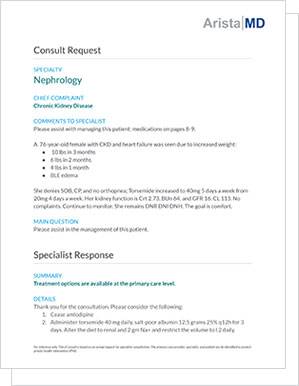SPECIALTY
Nephrology
CHIEF COMPLAINT
Chronic Kidney Disease
COMMENTS TO SPECIALIST
Please assist with managing this patient: medications on pages 8-9.
This nephrology consult is for a female with CKD and heart failure due to increased weight:
- 10 lbs in 3 months
- 6 lbs in 2 months
- 4 lbs in 1 month
- BLE edema
She denies SOB, CP, and no orthopnea; Torsemide increased to 40mg 5 days a week from 20mg 4 days a week. Her kidney function is Crt 2.73, BUn 64, and GFR 16. CL 113. No complaints. Continue to monitor. She remains DNR DNI DNH. The goal is comfort.
MAIN QUESTION
Please assist in the management of this patient.
For reference only. This eConsult is based on an actual request for specialist consultation. The primary care provider, specialist, and patient are de-identified to protect private health information (PHI).
Common Challenges to Achieve Clinical Quality Goals: Containment

Containment in healthcare involves equipping providers with the appropriate recommendations to effectively manage a patient’s care within their practice without the need for unnecessary referrals or consultations outside of the practice. This is particularly important in ensuring efficient resource utilization and reducing healthcare costs while maintaining high-quality care. Collaboration between the practice and eConsult providers is crucial in this process. By working closely together, healthcare teams can assess patient needs more comprehensively, share relevant information seamlessly, and leverage specialist expertise when necessary, all while keeping the patient’s care within the primary care setting when possible.
Containment is impacted by:
Specificity of the eConsult request and inclusion of appropriate patient history and testing
One critical factor that impacts containment is the specificity of eConsult requests and the inclusion of appropriate patient history and testing. When healthcare providers submit eConsults with clear and detailed information about the patient’s condition, medical history, and relevant tests, it enables specialists to provide accurate and targeted recommendations. This specificity helps avoid unnecessary procedures, tests, or consultations, reducing healthcare costs and improving efficiency. Additionally, thorough documentation of patient information ensures that healthcare decisions are based on a comprehensive understanding of the patient’s needs, leading to better clinical outcomes and overall satisfaction with care. By emphasizing the importance of detailed eConsult requests and extensive patient information, healthcare organizations can enhance containment efforts and optimize resource utilization while delivering high-quality care.
GET IN TOUCH
Ready to deliver lower-cost care without sacrificing quality?

